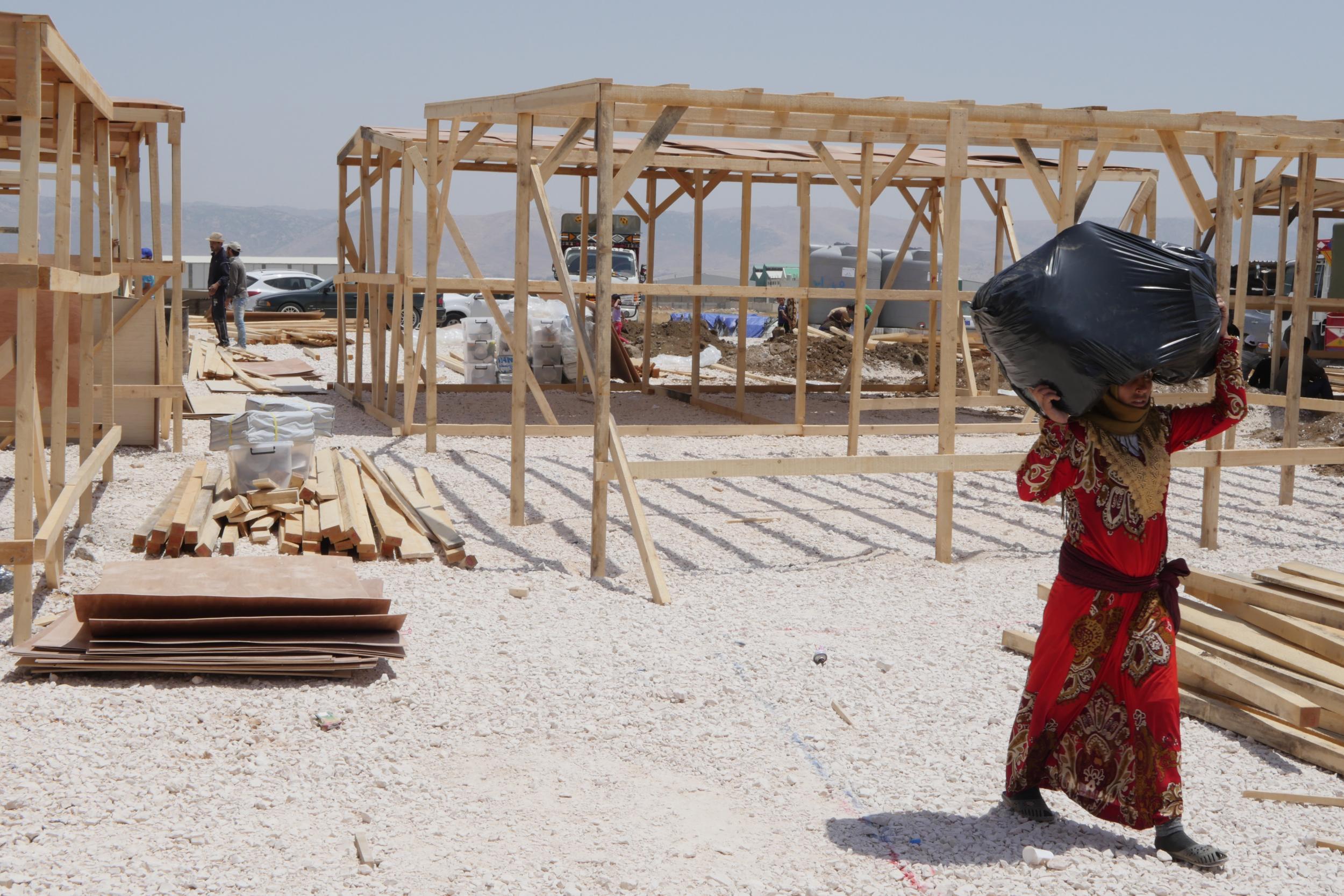Locals in Lebanon help Syrians who lost everything in devastating refugee camp fire
Clothing, food and other donations sadly now rare example of neighbourliness in a country where many feel the economic burden of 1.5 million refugees
“I am actually startled by the response and how quickly the rebuilding has been able to start. I’ve never seen anything like it,” said Antoine Ghazaly, Unicef’s child protection officer for Bekaa Governorate.
Qab Elias refugee camp - which burned to the ground last week - is a scene of intense activity despite the blazing midday sun. Two bulldozers drag up earth to create space for new sewage tanks, water trucks relay back and forth, and men, women and children are busy putting up timber frames for modest houses. Engines and tools mean it’s so noisy families have to shout at each other to be heard. The smell of burnt fuel and metal still lingers on the edges of the camp.
In the past week not just one but two devastating fires hit informal refugee settlements for Syrians in Lebanon’s poverty-stricken Bekaa Valley - killing two children and destroying the identification papers and meagre possessions of some 1,400 people.
Both are believed to have been cooking accidents, which are common in the haphazardly built camps in which many Syrians in Lebanon live. While they are normally quickly contained, the July heat wave and nearby wheat crop meant the two blazes spread rapidly. Only five tents across both sites survived - and even they were heavily damaged.
The devastating fires sent towers of smoke into the air which were visible for miles and took hours to put out. For many in Lebanon - a country where one in four people are refugees - they have served as a reminder of the conditions many of the country’s estimated 1.5 million Syrians are forced to live in, and given local communities the opportunity to show they still care.
Dozens of people from neighbouring towns and villages have arrived at the camps with trucks of clothes, food, water and other donations, and nearby construction companies have suspended other projects to take part in the reconstruction work for less money they they’d earn on private contracts.
“We are very grateful,” said camp resident Bardah al Ghanen, originally from Deir Ez Zour, a town now besieged by Isis.
“It was heartbreaking to lose everything again. I felt numb about it. But we are touched by how generous people have been.”

Wary of how generations of Palestinians stayed in Lebanon after fleeing the 1948 Arab-Israeli war, when Syrians began to arrive in the country in earnest in 2013, the government refused to build official refugee camps in an effort to dissuade people from staying.
After more than six years of war next door, the plight of Syrians is no longer an emergency response; while initially many Lebanese went above and beyond to help their neighbours, the country has become accustomed to the misery on its doorstep. Some even exploit it. Trafficking of women, ruthless landlords and child labour have become endemic problems.
Unaware of the macro benefits the mass influx of people has brought to the country - international NGO money has propped up Lebanon’s ageing water systems and failing schools in recent years - Syrians are often the target of discrimination and dangerous levels of racism.
The deaths of at least four Syrian men in the custody of the Lebanese army following a raid that turned violent in a camp outside the northern city of Arsal earlier this month has caused particular outrage.
!["The only thing that will really make the crisis go away is if the [Syrian] war ends,” a volunteer with a local charity said](https://static.independent.co.uk/s3fs-public/thumbnails/image/2017/07/11/13/p1050992-2.jpg)
Many Syrians The Independent spoke with hinted darkly that the fires in the Bekaa Valley may have been started on purpose as revenge for the incident, in which six soldiers were injured.
But still: the generosity shown by Lebanese locals towards those who have once again lost everything has been startling - especially when contrasted with the hostile attitude towards refugees in many Western countries, including the UK.
Just a week after the fire at Qab Elias, the new semi-permanent breezeblock, timber and tarpaulin homes are 90 per cent complete.
“What can you do, ignore those in need?”, a volunteer with local charity Dar al-Fatwa said, handing out boxes of donated clothes. “These people need our help all the time, not just when there is a fire. The only thing that will really make the crisis go away is if the war ends."
Join our commenting forum
Join thought-provoking conversations, follow other Independent readers and see their replies
Comments
Bookmark popover
Removed from bookmarks